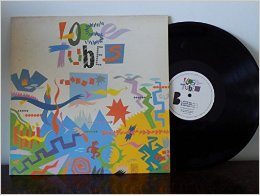Anyone who got into jazz in the 1980s must surely have a soft spot for the legendary anarcho-big band Loose Tubes.
I saw them play live sometime around 1986 in one of those great community-run London venues (Logan Hall? Shaw Theatre? Camden Arts Centre?) that appeared quickly, burnt brightly and then disappeared.
I don’t recall much about the music but do remember the crowd; the jazz revival was in full flight so there were lots of very hip people wearing chinos, black polo-necks and sometimes even berets dancing unashamedly.
Then, a bit later, Loose Tubes played on Saturday-evening primetime TV wearing very loud clothes, dancing idiotically and generally clowning around with the audience. It was youthful and different and gave Big Band Jazz a much-needed makeover.
Of course there’s always the chance that some people just didn’t think of their music as ‘jazz’ at all, and their clowning may well have put a lot of potential punters off. But the band probably weren’t too bothered about that.

In a way, the Loose Tubes could only have originated in the ’80s, emerging as it did from composer and educator Graham Collier‘s community big band workshops.
There was no ‘leader’ per se (although keyboards/French horn man Django Bates was occasionally seen conducting in very syncopated sections) and any member of the band was free to submit compositions.
Consequently, Loose Tubes’ music touched on anything that took its composers’ fancy – samba, heavy metal, folk, Weather Report-style fusion, flamenco, Hi-Life, blues, reggae, free jazz.
Their first self-titled album came out in the summer of 1985 and it was a really nice distillation of their sound (and featured one of my favourite UK drummers, Nic France, who left soon after the recording to join Working Week).
Django Bates’ composition ‘Yellow Field’ remains a classic. The followup Delightful Precipice is probably their best known album, and the final studio recording was 1988’s Teo Macero-produced Open Letter.
It was probably a miracle that such a huge band lasted as long as it did (six years) but Loose Tubes was also a superb career springboard for Bates, saxophonists Iain Ballamy, Julian Arguelles and Tim Whitehead, guitarist John Parricelli, flautist Eddie Parker, drummers Nic France/Steve Arguelles and ‘bone man Ashley Slater, all of whom are going strong today.
And guess what – they reformed in 2014, playing concerts at the Cheltenham Jazz Festival, Brecon Jazz Festival and a sold-out week at London’s Ronnie Scott’s. Two live album have also recently been released, Sad Afrika and Dancing On Frith Street, both of which featured music from their original farewell gig at Ronnie’s in September 1990.

